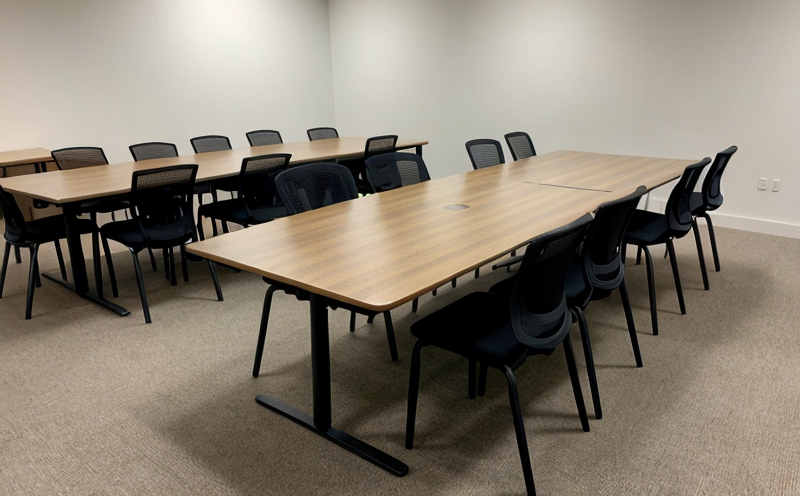ISO 16000-6 Indoor Air Quality Formaldehyde Emission Testing for Table Surfaces
The stringent demand for indoor air quality has driven the development of ISO 16000-6, a globally recognized standard that addresses formaldehyde emissions from various materials including table surfaces. This service ensures compliance with this international standard by conducting comprehensive testing that evaluates the release of formaldehyde from furniture products such as tables and desks.
Formaldehyde is a known carcinogen and can be released into indoor environments through various sources like particleboard, plywood, foam insulation materials, and other composite wood products used in manufacturing furniture. Compliance with ISO 16000-6 not only ensures the health and safety of consumers but also protects manufacturers from potential legal issues and reputational damage.
The testing process involves carefully selecting representative samples of table surfaces that are subjected to controlled conditions designed to simulate real-world usage scenarios. The formaldehyde emission is quantified in a chamber where the sample is exposed for a specified duration, followed by rigorous analysis using advanced instrumentation such as gas chromatography or photometric methods.
The testing process is meticulously planned and executed to ensure accurate results that are consistent with international standards. This includes precise specimen preparation, controlled environmental conditions, and the use of calibrated instruments. The service also provides detailed reports that outline the test procedure, data interpretation, and compliance status.
Quality managers, R&D engineers, and procurement teams can benefit significantly from this testing service by ensuring their products meet regulatory requirements and industry best practices. Compliance with ISO 16000-6 helps protect indoor air quality and promotes a healthier environment for all users of furniture products.
The table surfaces tested under this standard are subject to rigorous evaluation, which ensures that the formaldehyde emissions do not exceed acceptable limits set by international standards. This service is essential in maintaining high-quality product standards and fostering trust between manufacturers and consumers.
Scope and Methodology
| Parameter | Description |
|---|---|
| Test Specimen | Representative samples of table surfaces made from materials such as wood, particleboard, and MDF. |
| Environmental Conditions | Controlled temperature (23 ± 1°C) and relative humidity (50 ± 5%) to simulate real-world conditions. |
| Emission Measurement | Formaldehyde emissions are measured using a climate chamber with a volume of 60 liters. |
| Sampling Time | The test specimen is exposed to the controlled environment for at least 96 hours. |
| Data Analysis | Emission data are analyzed using gas chromatography (GC) or other suitable analytical methods. |
Benefits
- Ensure compliance with international standards for indoor air quality and formaldehyde emissions.
- Protect consumers from potential health risks associated with formaldehyde exposure.
- Promote a healthier environment by reducing the release of harmful chemicals into indoor spaces.
- Avoid legal issues and reputational damage that can arise from non-compliance with regulatory requirements.
- Enhance product reputation and marketability by demonstrating commitment to quality and safety standards.
- Gain competitive advantage through superior product performance and reliability.
- Support continuous improvement in manufacturing processes and product design for better environmental outcomes.
Eurolab Advantages
At Eurolab, we pride ourselves on providing cutting-edge testing services that are unparalleled in the industry. With our state-of-the-art facilities and experienced team of professionals, you can trust us to deliver accurate, reliable results that meet or exceed international standards.
We offer a full suite of furniture testing services tailored to your specific needs, including but not limited to ISO 16000-6 formaldehyde emissions testing. Our comprehensive approach ensures that every aspect of the test is conducted with precision and thoroughness, leaving no room for error.
Our commitment to quality extends beyond just conducting tests; we also provide expert advice on best practices for minimizing formaldehyde emissions in your products. This includes guidance on material selection, production processes, and design considerations that can help you achieve compliance more effectively.
With Eurolab, you gain access to a network of industry-leading professionals who are dedicated to helping you succeed. Whether you're looking to meet regulatory requirements or simply improve the quality of your products, our team is here to assist you every step of the way.





